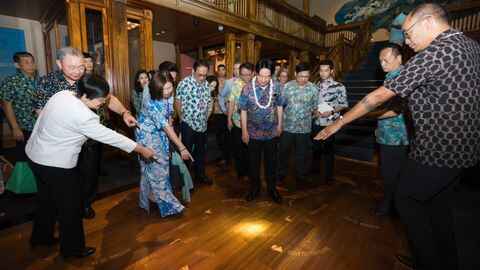China has threatened to “resolutely crush” any move at independence in response to Lai’s first foreign trip as president.
The governor of the island state of Hawaii welcomed Taiwanese President Lai Ching-te during his layover, and China claimed it “strongly condemned” the United States “arranging” the visit.
A spokeswoman for China’s foreign ministry said in a statement on Sunday that “China has lodged serious protests with the US and strongly condemns the US’s arranging for Lai Ching-te’s’stopover’.”
During his two-day layover in Hawaii on Saturday, Lai was greeted with red carpets, flower garlands, and “alohas” as he began a Pacific tour that has provoked venomous rhetoric from Beijing.
Lai, dressed casually in a Hawaiian shirt, hopped around the US island state, stopping at the USS Arizona Memorial in Pearl Harbor, an emergency management center, and a museum dedicated to Pacific island history.
His staff had claimed that he received the “red carpet treatment” on the Honolulu international airport’s tarmac, the first time a Taiwanese president had received such a reception.
Josh Green, the governor of Hawaii, and Ingrid Larson, the managing director of the American Institute in Taiwan (AIT) in Washington, met him.
Lai received “aloha” welcomes, garlands of vibrantly colored flowers or leaves, known as leis, and other Hawaiian presents at every step.
As he walked the red carpet for a dinner with Taiwanese expatriates and US government officials in the evening, Lai was given a standing ovation.
Appreciative of the United States
Lai said he was “grateful” to the United States for making the tour a success in his first public remarks of the week-long trip.
According to the head of the AIT, which acts as the de facto US embassy in Taiwan, Washington and Taipei have a “rock solid” connection.
Laura Rosenberger appeared on a pre-recorded video that was shown during the dinner. “The opportunity for you to engage with thought leaders, the diaspora’s community and state and local leaders is invaluable, and I know will contribute to further strengthening the rock solid US-Taiwan partnership,” she said.
Beijing resents official communication between the island and the United States in particular and is against Taiwan’s claim to be a sovereign state and any international recognition of it.
Washington, like the majority of nations, is Taiwan’s largest ally and arms supplier but does not recognize it diplomatically.






